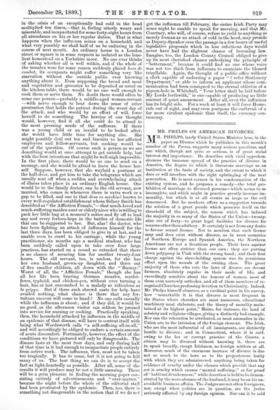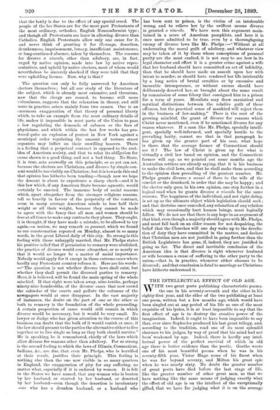MR. PHELPS ON AMERICAN DIVORCES.
MR. PHELPS, lately United States Minister here, in the paper on Divorce which he publishes in this month's number of the Forum, suggests many serious questions, and one which, though not quite so serious, is of great social interest mad importance. He describes with vivid apprehen- siveness the immense spread of the practice of divorce in America, the degree to which it threatens marriage as an institution at the basis of society, and the extent to which it does or will interfere with the right upbringing of the next generation. He is most earnest in his condemnation of the existing system, and he proposes a remedy—the total pro- hibition of marriage to divorced persons—which seems to us incomplete, and which might in practice greatly increase im- morality, but which is at all events as large as the evil denounced. But he nowhere offers us a suggestion towards the solution of a great puzzle which presents itself on the threshold of the subject, the reason which has induced the majority in so many of the States of the Union—twenty- nine out of forty—to grant legal facilities for divorce for reasons other than adultery. It certainly is not from any desire to favour sexual license. Not to mention that such license may and does exist without divorce, as in most countries of Southern Europe and Spanish America, the Northern Americans are not a licentious people. Their laws against license are often stricter than our own ; they are putting down polygamy in Utah with the strong hand ; and their first charge against the slave-holding system was its pernicious effect upon the morals of the owning class. The great majority of those who vote the laws of divorce are decent farmers, absolutely regular in their mode of life, and exceedingly sensitive about the honour of women, most of them even narrowly orthodox, and all of them members of re- cognised Churches professing devotion to Christianity. Indeed, Mr. Phelps himself observes, as a cardinal point in his survey, how " remarkable it is that divorce is most frequent in the States where churches are most numerous, educational machinery most elaborate, and the theory of morality main- tained at its highest point," Maine, for instance, the land of sobriety and religious villages, giving a distinctly bad example. Nor can the relaxation be attributed, as most anomalies in the Union are, to the intrusion of the foreign element. The Irish, who are the most influential of all immigrants, are distinctly hostile to divorce ; and in Connecticut, where it is said, owing to the lax or corrupt practice of the Courts, a citizen may be divorced without knowing it, there are to speak broadly, except Irishmen, no foreign settlers at all. Moreover, much of the enormous increase of divorce is due not so much to the laws as to the preposterous laxity with which they are administered, anything being taken for evidence of cruelty under the clauses which provide that any act is cruelty which causes "mental suffering ;" or for proof of " habitual drunkenness;" while desertion is held to be demon- strated by the mere absence of the husband, it may be on his un- avoidable business affairs. The Judges are not often foreigners, nor, except when politics are in question, are the juries seriously affected by any foreign opinion. Nor can it be said
that the laxity is due to the effect of any special creed. The people of the lax States are for the most part Protestants of the most ordinary, orthodox, English Nonconformist type ; and though all Protestants are taxer in allowing divorce than Catholics, English Protestants allow only one cause for it, and never think of granting it for ill-usage, desertion, drunkenness, imprisonment, lunacy, insufficient maintenance, or long-continued absence, taken by themselves. The reasons for divorce a vincula, other than adultery, are, in fact, urged by native opinion, made into law by native repre- sentatives, and upheld by native electors, most of whom would nevertheless be sincerely shocked if they were told that they were upholding license. Now, why is that P The question can only be fully answered by American electors themselves ; but all our study of the literature of the subject, which is already most extensive, and threatens, now that the clergy are roused, to become still more voluminous, suggests that the relaxation in theory, and still more in practice, arises mainly from two causes. One is an
• enormous exaggeration of that theory of personal liberty which, to take an example from the most ordinary details of life, makes it impossible in most parts of the Union to pass a law regulating the demands of cabmen or the fees of physicians, and which within the last few weeks has pro- duced quite an explosion of protest in New York against a municipal order regulating the amount of torture street organists may inflict on their unwilling hearers. There is a feeling that a perpetual contract is opposed to the root- idea of American society, and that to relax its obligation for cause shown is a good thing, and not a bad thing. No State, it is true, acts avowedly on this principle, or as yet can act, because the electors are Christians, and divorce by simple con- sent would be too visibly un-Christian; but it is towards this end that opinion has hitherto been tending—though now we hope the descent is about to experience a sharp check—and it is this law which, if any American State became agnostic, would certainly be enacted. The immense body of social reasons which, apart altogether from the stronger religious reasons, tell so heavily in favour of the perpetuity of the contract, seem in many average American minds to lose half their weight or all their weight, because they cannot be made to agree with the fancy that all men and women should be -free at all times to make any contracts they please. They ought, it is thought, if they have made a mistake, to be allowed to try -again,—a notion, we may remark en passant, which we found to our consternation repeated on Monday, almost in so many words, in the great Liberal daily of this city. So strong is this feeling with those unhappily married, that Mr. Phelps states his positive belief that if permission to remarry were abolished, the practice of divorce would cease altogether, or so nearly so that it would no longer be a matter of social importance. Nobody would apply for it except in those extreme cases where hardly any Protestant country refuses it. Here are his words : —" The question is not whether divorce laws shall exist, but whether they shall permit the divorced parties to remarry. Here, it is believed, will be found the main spring of the whole mischief. If that right were taken away, nine-tenths, perhaps ninety-nine hundredths, of the divorce cases that now crowd the calendar of the courts and pollute the columns of the newspapers would at once disappear. In the vast majority of instances, the desire on the part of one or the other or both to remarry is the foundation of the whole proceeding. A certain proportion of cases would still remain in which divorce would be necessary, but it would be very small. No lawyer or Judge who has given attention to the course of this business can doubt that the bulk of it would vanish at once, if the law should present to the parties the alternative either to live together or to live single so long as they both should survive." He is speaking, be it remembered, chiefly of the laws which allow divorce for reasons other than adultery. For so strong is the second feeling to which the laws of Illinois, Connecticut, Indiana, &c., are due, that even Mr. Phelps, who is horrified at their result, justifies their principle. This feeling is nothing else than the one now visible in so many quarters in England, the exaggeration of pity for any suffering, no matter what, especially if it is endured by women. It is felt in the States we have named, that any woman who is beaten by her husband, or starved by her husband, or deserted by her husband—even though the desertion is involuntary —or who has a drunken husband, or a husband who has been sent to prison, is the victim of an intolerable wrong, and to relieve her by the swiftest means divorce is granted a vincula. We have seen this argument main- tained in a score of American pamphlets, and here it is once more admitted to be true, even by a thoroughgoing enemy of divorce laws like Mr. Phelps :—" Without at all underrating the moral guilt of adultery, and whatever view may be taken of it by those whose conceptions of personal purity are the most exalted, it is not easy to see how in its legal character and effect it is a greater crime against a wife that her husband should have committed an act of infidelity, than that he should have made an assault upon her with intent to murder, or should have rendered her life intolerable by a long series of brutal cruelties or by excessive and incurable intemperance, or without excuse should have deliberately deserted her, or brought about the same result by commission of some felony that consigned hini to a prison for a term of years. Moralists may draw casuistical and mystical distinctions between the relative guilt of these offences, but the practical sense of mankind will reject them in the business of law-making." There is the root of the growing mischief, the grant of divorce for reasons which Christ never mentioned, even if he sanctioned divorce for any reason whatever. If a man like Mr. Phelps, specially intelli- gent, specially well-informed, and specially hostile to the prevailing laxity, cannot see that in that paragraph he has given up the greater part of his case, what hope is there that the average farmer of Connecticut should see it ? The law of Christ is given up for what is virtually a civil law based on opinion, and the Connecticut farmer will say, as we pointed out some months ago the Australian settlers are already saying, that it is his business to make the civil laws, and that he shall make them according to the opinion then prevailing of the greatest number. Mr. Phelps grants divorce a mensci et thoro to the wife of the convict or the drunkard, in order that she may be happy ; and the elector only goes, in his own opinion, one step farther in a logical road when he grants divorce a vincula for the same reasons. The happiness of the individual, and not right-doing, is set up as the ultimate object which legislation should seek ; and that doctrine once conceded, any relaxation of any relation which may occasionally hurt human beings, must logically follow. We do not see that there is any hope in an argument of that kind, even though a majority should agree with Mr. Phelps, and must fall back on an older reason for not despairing, the belief that the Churches will one day wake up to the derelic- tion of duty they have committed in the matter, and declare that Christian men are not justified in going farther than the British Legislature has gone, if, indeed, they are justified in going so far. The direct and inevitable conclusion of the American idea is that divorce is right whenever husband or wife becomes a cause of suffering to the other party to the union,—that is, in practice, whenever either chooses to be divorced; and that conclusion is fatal to marriage as Christians have hitherto understood it.



































 Previous page
Previous page